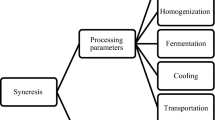Summary
In experiments on dogs a study was made of the role played by the lymphatic system in the acceleration of blood coagulation after acute blood loss. After blood letting the clotting time decreased in all the experiments except one. As distinct from blood, the rate of lymph coagulation remained unchanged. Disturbed lymph circulation, caused by cannulzation of the chief lymph collectors, did not exclude acceleration of blood coagulation after blood letting. Thus, acceleration of blood coagulation following blood loss was not caused by the penetration of factors stimulating hemocoagulation through the lymph. The factor, causing blood hypercoagulation, does not gain access to the lymph in significant quantity.
Similar content being viewed by others
Author information
Authors and Affiliations
Rights and permissions
About this article
Cite this article
Zubairov, D.M., Kurochkin, V.I. Clotting power and protein composition of lymph and blood after acute blood loss. Bull Exp Biol Med 57, 275–276 (1964). https://doi.org/10.1007/BF00781906
Received:
Issue Date:
DOI: https://doi.org/10.1007/BF00781906




